Robert_Frost
- 格式:doc
- 大小:102.50 KB
- 文档页数:10
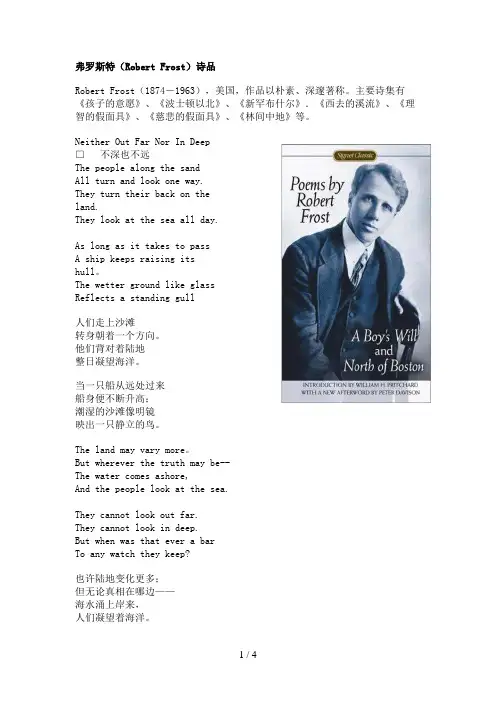
弗罗斯特(Robert Frost)诗品Robert Frost(1874-1963),美国,作品以朴素、深邃著称。
主要诗集有《孩子的意愿》、《波士顿以北》、《新罕布什尔》.《西去的溪流》、《理智的假面具》、《慈悲的假面具》、《林间中地》等。
Neither Out Far Nor In Deep□不深也不远The people along the sandAll turn and look one way.They turn their back on theland.They look at the sea all day.As long as it takes to passA ship keeps raising itshull。
The wetter ground like glassReflects a standing gull人们走上沙滩转身朝着一个方向。
他们背对着陆地整日凝望海洋。
当一只船从远处过来船身便不断升高;潮湿的沙滩像明镜映出一只静立的鸟。
The land may vary more。
But wherever the truth may be--The water comes ashore,And the people look at the sea.They cannot look out far.They cannot look in deep.But when was that ever a barTo any watch they keep?也许陆地变化更多;但无论真相在哪边——海水涌上岸来,人们凝望着海洋。
他们望不太深。
他们望不太远。
但有什么能够遮挡他们凝望的目光?The Road Not Taken□ 未选择的路Two roads diverged in a yellow wood, And sorry I could not travel bothAnd be one traveler, long I stoodAnd looked down one as far as I could To where it bent in the undergrowth。

罗伯特弗罗斯特的历史故事罗伯特弗罗斯特(Robert Frost)是美国著名的诗人和散文家,他以写作具有深刻哲理和富有意境的作品而闻名于世。
他的历史故事不仅仅是关于他个人的生平经历,更是关于时间、光阴和人生的深刻思考。
本文将围绕罗伯特弗罗斯特的历史故事展开探讨,带领读者一起领略他的文学世界。
一、早年的艰辛罗伯特弗罗斯特于1874年生于美国加州,他的童年时光充满了艰辛和挑战。
在早年,他的父亲因事业失败而去世,家庭陷入了经济困境。
年幼的罗伯特不得不与家人一起辛勤劳作,帮助维持生计。
这段经历不仅磨砺了他的意志,也深深地影响了他后来的创作。
二、诗歌创作的初试尽管早年的生活并不轻松,但罗伯特对于诗歌的兴趣却从未减退。
年少的他就喜欢读诗,积极尝试着用自己的笔触创作。
早期的作品虽然并未获得广泛的认可,但却奠定了他后来成为伟大诗人的基础。
三、挫折与成功虽然罗伯特经历了许多挫折,但他并没有放弃自己的梦想。
在他40岁左右的时候,他的诗歌终于开始获得了大众的关注和赞赏。
他的作品《小路不选》被广泛传播,成为他最著名的作品之一。
从那时起,罗伯特弗罗斯特的诗歌创作迎来了巅峰时期。
四、诗歌中的哲学思考罗伯特弗罗斯特的诗歌作品经常描绘出人类生活中的困境和挣扎,引发读者们对人生和存在的思考。
他的作品透露着深邃的哲学意味,让人们不仅仅被其美丽的文字所吸引,更是被其寓意所震撼。
五、文学成就和影响罗伯特弗罗斯特被誉为20世纪美国最伟大的诗人之一,他的作品对于当代文学产生了深远的影响。
他充满哲理和意境的创作方式,使他的作品跨越时空,传承至今。
六、结语罗伯特弗罗斯特的历史故事是一个关于执着和坚持的故事,他在面对困难和挫折时从未放弃自己的梦想。
通过他的作品,我们也可以感受到人生的真谛和哲理。
罗伯特弗罗斯特的创作不仅表达了个人的情感和思考,更是反映了人类普遍的追求和探索。
以上是关于罗伯特弗罗斯特的历史故事的一些论述,通过深入了解他的作品和生平经历,我们可以更好地理解他的文学成就和影响。
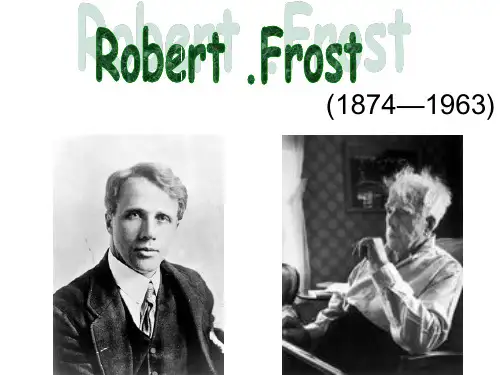

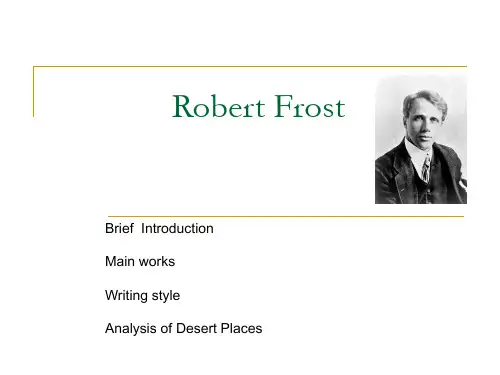
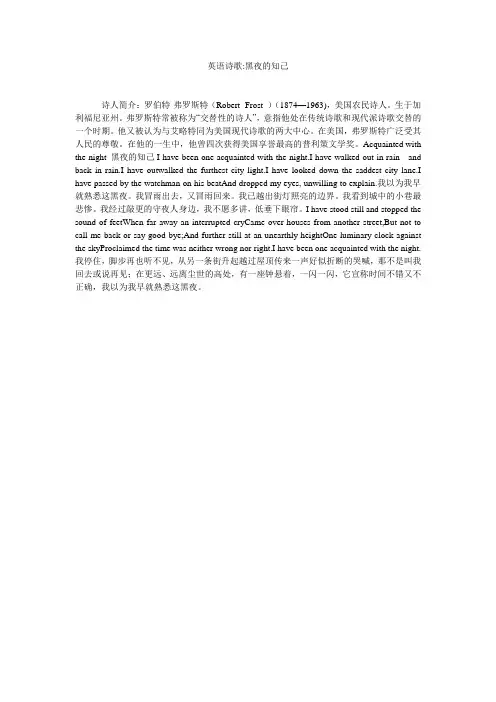
英语诗歌:黑夜的知己诗人简介:罗伯特·弗罗斯特(Robert ·Frost )(1874—1963),美国农民诗人。
生于加利福尼亚州。
弗罗斯特常被称为“交替性的诗人”,意指他处在传统诗歌和现代派诗歌交替的一个时期。
他又被认为与艾略特同为美国现代诗歌的两大中心。
在美国,弗罗斯特广泛受其人民的尊敬。
在他的一生中,他曾四次获得美国享誉最高的普利策文学奖。
Acquainted with the night 黑夜的知己I have been one acquainted with the night.I have walked out in rain --and back in rain.I have outwalked the furthest city light.I have looked down the saddest city lane.I have passed by the watchman on his beatAnd dropped my eyes, unwilling to explain.我以为我早就熟悉这黑夜。
我冒雨出去,又冒雨回来。
我已越出街灯照亮的边界。
我看到城中的小巷最悲惨。
我经过敲更的守夜人身边,我不愿多讲,低垂下眼帘。
I have stood still and stopped the sound of feetWhen far away an interrupted cryCame over houses from another street,But not to call me back or say good-bye;And further still at an unearthly heightOne luminary clock against the skyProclaimed the time was neither wrong nor right.I have been one acquainted with the night.我停住,脚步再也听不见,从另一条街升起越过屋顶传来一声好似折断的哭喊,那不是叫我回去或说再见;在更远、远离尘世的高处,有一座钟悬着,一闪一闪,它宣称时间不错又不正确,我以为我早就熟悉这黑夜。
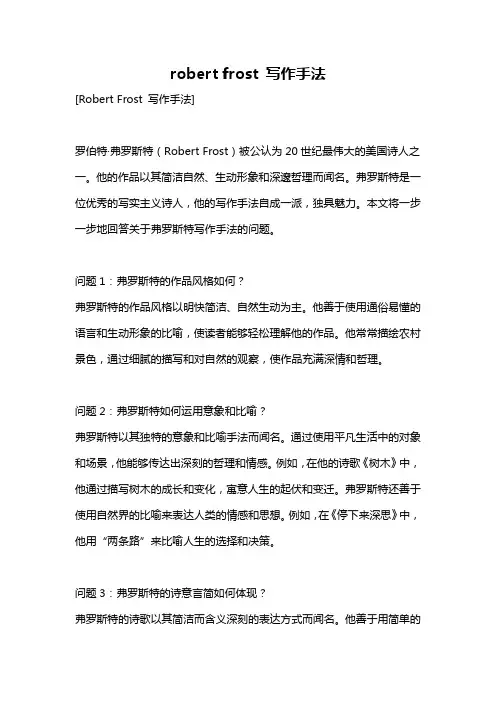
robert frost 写作手法[Robert Frost 写作手法]罗伯特·弗罗斯特(Robert Frost)被公认为20世纪最伟大的美国诗人之一。
他的作品以其简洁自然、生动形象和深邃哲理而闻名。
弗罗斯特是一位优秀的写实主义诗人,他的写作手法自成一派,独具魅力。
本文将一步一步地回答关于弗罗斯特写作手法的问题。
问题1:弗罗斯特的作品风格如何?弗罗斯特的作品风格以明快简洁、自然生动为主。
他善于使用通俗易懂的语言和生动形象的比喻,使读者能够轻松理解他的作品。
他常常描绘农村景色,通过细腻的描写和对自然的观察,使作品充满深情和哲理。
问题2:弗罗斯特如何运用意象和比喻?弗罗斯特以其独特的意象和比喻手法而闻名。
通过使用平凡生活中的对象和场景,他能够传达出深刻的哲理和情感。
例如,在他的诗歌《树木》中,他通过描写树木的成长和变化,寓意人生的起伏和变迁。
弗罗斯特还善于使用自然界的比喻来表达人类的情感和思想。
例如,在《停下来深思》中,他用“两条路”来比喻人生的选择和决策。
问题3:弗罗斯特的诗意言简如何体现?弗罗斯特的诗歌以其简洁而含义深刻的表达方式而闻名。
他善于用简单的句子和平实的语言来表达复杂的思想和情感。
这种简洁形式的使用使读者更易于理解和共鸣。
同时,他经常使用隐晦的形象和修辞手法,以引发读者的想象力和思考。
问题4:弗罗斯特如何平衡写实主义与象征主义?弗罗斯特的作品既具有写实主义的特点,又充满象征主义的意味。
他通过真实的物象和情节来表达人类的内心体验和社会现实。
同时,他也运用象征主义的手法来强调更深层次的主题和哲理。
这种平衡使他的作品不仅充满了现实感,同时也具有更深远的意义。
问题5:弗罗斯特的作品中常见的主题有哪些?弗罗斯特的作品涉及了多种主题,如人类生活和自然的关系、人生选择和决策、孤独和社交、时间和记忆等。
他常常通过探索这些主题来揭示人类的情感和思想。
例如,在《停下来深思》中,他通过两条路的象征来探讨人生中重要的选择。

罗伯特弗罗斯特美国现代诗歌的代表与创作罗伯特·弗罗斯特(Robert Frost)是20世纪美国现代诗歌的代表性作家之一,他的作品充满着对大自然、生活与人类存在的思考与感悟。
本文将从弗罗斯特的代表作品、其对现代诗歌的影响以及他的创作风格等几个方面展开论述。
一、弗罗斯特的代表作品弗罗斯特的代表作品包括《松树》、《路未选择》、《停驻的雪》等,这些作品多以自然景观为背景,通过细腻的描写与抒情的笔调,表达了作家对人生、选择和面对困境的思考。
在《松树》中,弗罗斯特通过描绘一棵独立坚强的松树,表达了自然界力量与人类生命的共鸣,反映了自身与大自然的紧密联系。
《路未选择》以选择分岔路的场景为基础,通过描述主人公做出的选择,表达了对人生抉择与命运的思考。
《停驻的雪》则以一场下雪为背景,通过雪的静默无声与对生命的思考,拓展了人们对于时间与存在的认识。
这些作品以其丰富的意象、情感流露与寓意深远的主题,成为了弗罗斯特诗歌创作的代表,也对20世纪美国现代诗歌的发展与影响产生了深远的影响。
二、对现代诗歌的影响弗罗斯特的诗歌作品不仅在当时引起了广泛的共鸣与关注,也对现代诗歌的发展与演变产生了深远的影响。
首先,弗罗斯特的诗作具有深入人心的主题与情感表达。
他以朴素的语言和自然的意象,将复杂的人生哲理与普遍的人性关怀表现得淋漓尽致。
这种诗歌风格打破了传统意义上诗歌的艰涩与繁复,使诗歌更贴近普通读者的日常经验,使现代诗歌获得更多读者的认同与喜爱。
其次,弗罗斯特的作品在形式上也对现代诗歌产生了创新的影响。
他善于运用韵律、押韵与排比等修辞手法,使诗歌的音乐性更加突出,形成了独特而富有韵律感的写作风格。
他的作品以其平易近人的形式,积极推动了现代诗歌形式的多样化与开放性,为后来的诗人们提供了借鉴与启发。
三、弗罗斯特的创作风格弗罗斯特的创作风格以其写实与叙事的特点著称,他以简洁明了的语言描绘日常生活中的场景,通过对细节的关注与思考,探究生命的意义与存在的哲学。
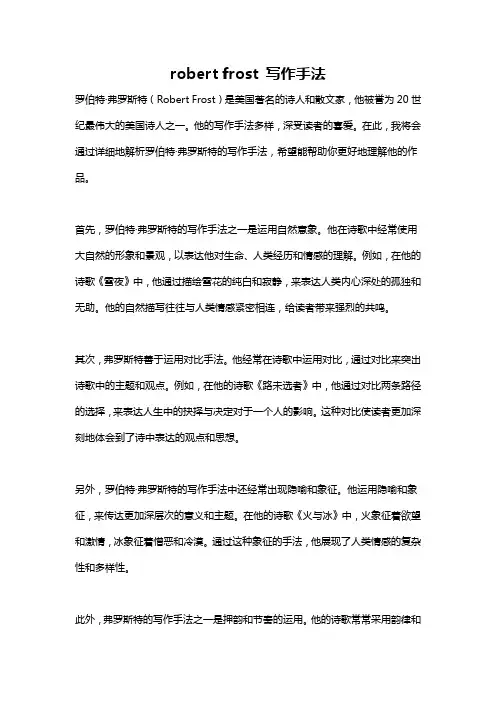
robert frost 写作手法罗伯特·弗罗斯特(Robert Frost)是美国著名的诗人和散文家,他被誉为20世纪最伟大的美国诗人之一。
他的写作手法多样,深受读者的喜爱。
在此,我将会通过详细地解析罗伯特·弗罗斯特的写作手法,希望能帮助你更好地理解他的作品。
首先,罗伯特·弗罗斯特的写作手法之一是运用自然意象。
他在诗歌中经常使用大自然的形象和景观,以表达他对生命、人类经历和情感的理解。
例如,在他的诗歌《雪夜》中,他通过描绘雪花的纯白和寂静,来表达人类内心深处的孤独和无助。
他的自然描写往往与人类情感紧密相连,给读者带来强烈的共鸣。
其次,弗罗斯特善于运用对比手法。
他经常在诗歌中运用对比,通过对比来突出诗歌中的主题和观点。
例如,在他的诗歌《路未选者》中,他通过对比两条路径的选择,来表达人生中的抉择与决定对于一个人的影响。
这种对比使读者更加深刻地体会到了诗中表达的观点和思想。
另外,罗伯特·弗罗斯特的写作手法中还经常出现隐喻和象征。
他运用隐喻和象征,来传达更加深层次的意义和主题。
在他的诗歌《火与冰》中,火象征着欲望和激情,冰象征着憎恶和冷漠。
通过这种象征的手法,他展现了人类情感的复杂性和多样性。
此外,弗罗斯特的写作手法之一是押韵和节奏的运用。
他的诗歌常常采用韵律和押韵的形式,通过诗歌的节奏和音韵,给读者带来一种美妙的音乐感受。
他的韵律和押韵的运用让他的诗歌更加动听和易于记忆。
最后,罗伯特·弗罗斯特的写作手法还包括使用简练的语言和直观的描写。
他的诗歌往往以简洁的文字和明确的形象来表达复杂的思想和情感。
这种简练和直观的写作风格使他的作品通俗易懂,让读者能够迅速理解并感受到他想要表达的意思。
综上所述,罗伯特·弗罗斯特的写作手法多种多样,是他作品受欢迎的重要原因之一。
他的作品常常通过自然意象、对比手法、隐喻和象征、押韵和节奏以及简练的语言和直观的描写,传达他对生命和人类情感的深刻理解。
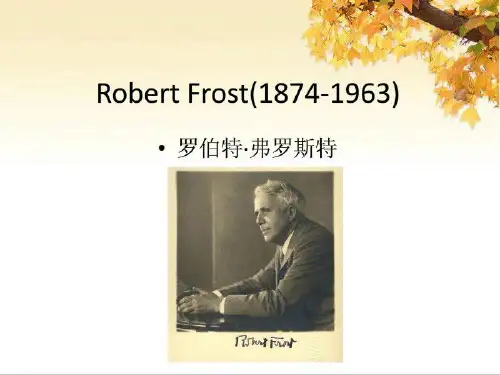
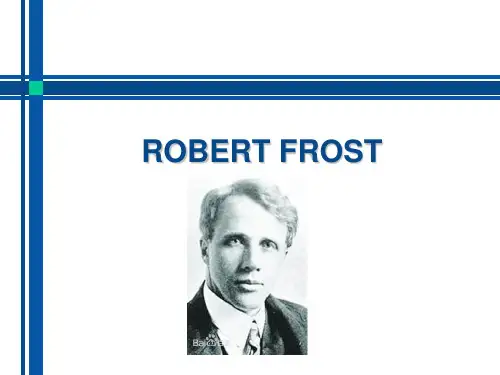
《未选择的路》(The Road Not Taken)是美国诗人罗伯特·弗罗斯特(Robert Frost)的一首脍炙人口的作品,描述了他在森林中面对两条路时的选择困境。
这首诗不仅被解读为对人生选择的深刻反思,也被视为对自然与人生哲理的探索。
诗中,弗罗斯特描绘了一个黄色的树林里分出两条路,他站在那里久久伫立,对着其中一条路极目望去,直到它消失在丛林深处。
这条路看似平坦而宽阔,另一条路则荒草萋萋,十分幽寂,旅人甚少涉足。
尽管那条更为荒凉的路充满了未知和挑战,弗罗斯特最终还是选择了它,因为在他看来,那条路“诱人”且“美丽”。
这首诗中的“路”具有多重象征意义。
一方面,它指代自然界中的道路,另一方面,它也暗喻了人生中的选择和决策。
弗罗斯特通过这首诗传达了人们在面对人生中的重大选择时,常常会感到迷茫和不安,但我们必须做出选择,并且一旦做出选择,就要坚定地走下去,即使前路充满未知和挑战。
这首诗不仅在美国文学史上占有重要地位,也因其深刻的哲理和优美的语言而广受欢迎。
它提醒我们,在人生的道路上,我们不仅要勇敢地做出选择,还要学会欣赏沿途的风景,即使那条路并不总是平坦和宽敞。
robert frost的写作风格-回复罗伯特·弗罗斯特是美国最受尊敬和广泛阅读的诗人之一。
他的诗歌以深邃的洞察力、朴素的语言和浓厚的地方色彩而闻名。
弗罗斯特的写作风格经常探索人类生活中存在的普遍主题,例如自然、孤独、决策和命运。
通过一步一步的分析,我们将更好地理解他的写作风格以及他对人类生活的独特见解。
首先,弗罗斯特的写作风格具有浓厚的地方色彩。
他生活在美国新英格兰地区,对这个地区的自然景观和人文风情有着深刻的认识。
在他的诗歌中,我们经常能够感受到他对新英格兰特有的四季变化的描绘,以及对农村生活和农民的赞美。
例如,在他的著名诗歌《停留并等待》中,他描述了一个雪夜中停在林子边路上的马车,展现了冬季寒冷的氛围和农村生活的安宁。
这种地方色彩为他的诗歌增添了一种真挚而独特的氛围。
其次,弗罗斯特的诗歌语言朴素而深入人心。
他运用简洁而自然的语言,直击人类内心的情感和思想。
他没有使用过多的修辞手法,而是通过简单的叙事和意象来表达他的思想。
这种朴素的语言使得读者很容易理解并共鸣他的诗歌。
例如,在他的诗歌《没走过的路》中,他用简练的语言描述了一个人面临两个道路选择的抉择,并表达了对错过机会的遗憾。
这种朴素而深刻的语言使得他的诗歌具有普遍性和可读性。
此外,弗罗斯特的诗歌常常探讨人类生活中的普遍主题。
他对人类的内心冲突、孤独和决策的关注贯穿了他的整个创作生涯。
他的诗歌反映了人类面临的选择和命运的无奈。
他试图通过他的诗歌揭示人类内心的矛盾和对未来的不确定感。
例如,在他的诗歌《雪夜》中,他描述了一个人在雪夜中独自旅行的情景,表达了人类生活中的孤独和无助。
这种对人类生活的深刻洞察力使得他的诗歌具有普遍的感知和价值。
最后,弗罗斯特的诗歌常常通过自然景观来传达人类的情感和思想。
自然在他的诗歌中常常被视为一个媒介,通过自然景观的描绘来传达人类的内心体验。
他对自然的描绘经常是美丽而饱满的,同时也富有象征意义。
例如,在他的诗歌《火与冰》中,他通过描述火和冰的特性来暗示人类情感的冷漠和热烈。
罗伯特·弗罗斯特语录1. "Two roads diverged in a wood, and I—I took the one less traveled by, And that has made all the difference." - From the poem "The Road Not Taken" by Robert Frost (出自罗伯特·弗罗斯特的诗歌《未选择的路》)2. "In three words I can sum up everything I've learned about life: it goes on." - From the poem "The Lesson for Today" by Robert Frost (出自罗伯特·弗罗斯特的诗歌《今天的教训》)3. "The best way out is always through." - From the poem "A Servant to Servants" by Robert Frost (出自罗伯特·弗罗斯特的诗歌《仆人的仆人》)4. "Poetry is when an emotion has found its thought and the thought has found words." - From an interview with Robert Frost (出自罗伯特·弗罗斯特的采访)5. "I have promises to keep, And miles to go before Isleep." - From the poem "Stopping by Woods on a Snowy Evening" by Robert Frost (出自罗伯特·弗罗斯特的诗歌《在雪夜驻足林间》)6. "Freedom lies in being bold." - From the poem "The Lesson for Today" by Robert Frost (出自罗伯特·弗罗斯特的诗歌《今天的教训》)7. "The only way out is through." - From the poem "A Servant to Servants" by Robert Frost (出自罗伯特·弗罗斯特的诗歌《仆人的仆人》)8. "Good fences make good neighbors." - From the poem "Mending Wall" by Robert Frost (出自罗伯特·弗罗斯特的诗歌《修墙》)9. "The woods are lovely, dark and deep, But I have promises to keep, And miles to go before I sleep." - From the poem "Stopping by Woods on a Snowy Evening" by Robert Frost (出自罗伯特·弗罗斯特的诗歌《在雪夜驻足林间》)10. "Education is the ability to listen to almostanything without losing your temper or your self-confidence." - From an interview with Robert Frost (出自罗伯特·弗罗斯特的采访)11. "I took the one less traveled by, And that has made all the difference." - From the poem "The Road Not Taken" by Robert Frost (出自罗伯特·弗罗斯特的诗歌《未选择的路》)12. "A poem begins as a lump in the throat, a sense of wrong, a homesickness, a lovesickness." - From an interview with Robert Frost (出自罗伯特·弗罗斯特的采访)13. "The woods are lovely, dark and deep." - From the poem "Stopping by Woods on a Snowy Evening" by Robert Frost (出自罗伯特·弗罗斯特的诗歌《在雪夜驻足林间》)14. "I shall be telling this with a sigh, Somewhere ages and ages hence: Two roads diverged in a wood, and I—I took the one less traveled by, And that has made all the difference." - From the poem "The Road Not Taken" by Robert Frost (出自罗伯特·弗罗斯特的诗歌《未选择的路》)15. "The woods are lovely, dark and deep, But I have promises to keep, And miles to go before I sleep, And miles to go before I sleep." - From the poem "Stopping by Woods on a Snowy Evening" by Robert Frost (出自罗伯特·弗罗斯特的诗歌《在雪夜驻足林间》)16. "Freedom lies in being bold." - From the poem "The Lesson for Today" by Robert Frost (出自罗伯特·弗罗斯特的诗歌《今天的教训》)17. "The best way out is always through." - From the poem "A Servant to Servants" by Robert Frost (出自罗伯特·弗罗斯特的诗歌《仆人的仆人》)18. "I have promises to keep, And miles to go before I sleep." - From the poem "Stopping by Woods on a Snowy Evening" by Robert Frost (出自罗伯特·弗罗斯特的诗歌《在雪夜驻足林间》)19. "Good fences make good neighbors." - From the poem "Mending Wall" by Robert Frost (出自罗伯特·弗罗斯特的诗歌《修墙》)20. "The only way out is through." - From the poem "A Servant to Servants" by Robert Frost (出自罗伯特·弗罗斯特的诗歌《仆人的仆人》)21. "Education is the ability to listen to almost anything without losing your temper or your self-confidence." - From an interview with Robert Frost (出自罗伯特·弗罗斯特的采访)22. "A poem begins as a lump in the throat, a sense of wrong, a homesickness, a lovesickness." - From an interview with Robert Frost (出自罗伯特·弗罗斯特的采访)23. "The woods are lovely, dark and deep." - From the poem "Stopping by Woods on a Snowy Evening" by Robert Frost (出自罗伯特·弗罗斯特的诗歌《在雪夜驻足林间》)24. "I shall be telling this with a sigh, Somewhere ages and ages hence: Two roads diverged in a wood, and I—I took the one less traveled by, And that has made all the difference." - From the poem "The Road Not Taken" by RobertFrost (出自罗伯特·弗罗斯特的诗歌《未选择的路》)25. "The woods are lovely, dark and deep, But I have promises to keep, And miles to go before I sleep, And miles to go before I sleep." - From the poem "Stopping by Woods on a Snowy Evening" by Robert Frost (出自罗伯特·弗罗斯特的诗歌《在雪夜驻足林间》)26. "Freedom lies in being bold." - From the poem "The Lesson for Today" by Robert Frost (出自罗伯特·弗罗斯特的诗歌《今天的教训》)27. "The best way out is always through." - From the poem "A Servant to Servants" by Robert Frost (出自罗伯特·弗罗斯特的诗歌《仆人的仆人》)28. "I have promises to keep, And miles to go before I sleep." - From the poem "Stopping by Woods on a Snowy Evening" by Robert Frost (出自罗伯特·弗罗斯特的诗歌《在雪夜驻足林间》)29. "Good fences make good neighbors." - From the poem"Mending Wall" by Robert Frost (出自罗伯特·弗罗斯特的诗歌《修墙》)30. "The only way out is through." - From the poem "A Servant to Servants" by Robert Frost (出自罗伯特·弗罗斯特的诗歌《仆人的仆人》)。
罗伯特·弗罗斯特语录(罗伯特·弗罗斯特)标题:罗伯特·弗罗斯特:诗意人生的指南导语:罗伯特·弗罗斯特(Robert Frost)是美国著名的诗人和散文家,他的作品以深邃的哲理和对自然的热爱而著称。
本文将通过罗伯特·弗罗斯特的语录,探讨他对于人生和自然的独特见解,并探索如何将这些智慧应用于我们的日常生活中。
段落一:自然的启示罗伯特·弗罗斯特曾说过:“自然是人类最好的老师。
”他对自然的热爱和敬畏贯穿了他的作品。
他通过观察自然界中的变化和循环,发现了许多关于生活的启示。
我们可以从他的作品中学到,无论是在繁忙的城市还是在宁静的乡村,我们都可以从自然中汲取灵感和智慧。
段落二:人生的选择弗罗斯特的诗歌中经常涉及人生的选择和困境。
他说:“两条路分叉在树林中,而我选择了人迹罕至的一条。
”这句话表达了他对于决策和选择的思考。
他认为每个人都面临着选择,而选择所带来的结果将决定我们的人生道路。
他鼓励人们勇敢地面对选择,并相信自己的决策。
段落三:逆境中的坚持弗罗斯特的作品中充满了对逆境和挑战的探索。
他说:“道路并不总是平坦的,但是我们必须坚持走下去。
”这句话表达了他对于坚持和勇气的理解。
他认为人生中的挫折和困难是不可避免的,但只有坚持和勇敢面对,我们才能超越自己,实现自己的梦想。
段落四:人与自然的关系弗罗斯特的作品中强调了人与自然之间的紧密联系。
他说:“我们是自然的一部分,而不是它的主宰。
”他认为人类应该尊重自然,与之和谐相处。
他的作品中充满了对自然美的赞美和对人类与自然共生的思考。
他鼓励人们保护环境,珍惜自然资源。
结语:罗伯特·弗罗斯特的语录不仅仅是一些美丽的诗句,更是对于人生和自然的深刻思考。
通过他的作品,我们可以学习到如何与自然和谐相处,如何勇敢地面对人生的选择和挑战,以及如何坚持自己的信念。
让我们从弗罗斯特的智慧中汲取灵感,将诗意融入我们的生活,创造出美丽而有意义的人生旅程。
弗罗斯特经典诗歌双语赏析弗罗斯特(Robert Frost)美国著名的诗人。
1874年3月26日生于美国西部的旧金山。
他是第一个四次获得普利策奖的人。
主要诗集有《孩子的意愿》、《波士顿以北》、《新罕布什尔》、《西去的溪流》、《理智的假面具》、《慈悲的假面具》、《林间中地》等。
下面店铺为大家带来弗罗斯特经典诗歌双语赏析,欢迎大家阅读!弗罗斯特经典诗歌双语赏析:山The mountain held the town as in a shadowI saw so much before I slept there once:I noticed that I missed stars in the west,Where its black body cut into the sky.Near me it seemed: I felt it like a wallBehind which I was sheltered from a wind.And yet between the town and it I found,When I walked forth at dawn to see new things,Were fields, a river, and beyond, more fields.The river at the time was fallen away,And made a widespread brawl on cobble-stones;But the signs showed what it had done in spring;Good grass-land gullied out, and in the grassRidges of sand, and driftwood stripped of bark.I crossed the river and swung round the mountain.And there I met a man who moved so slowWith white-faced oxen in a heavy cart,It seemed no hand to stop him altogether."What town is this?" I asked."This? Lunenburg."Then I was wrong: the town of my sojourn,Beyond the bridge, was not that of the mountain,But only felt at night its shadowy presence. "Where is your village? Very far from here?" "There is no village--only scattered farms.We were but sixty voters last election.We can't in nature grow to many more:That thing takes all the room!" He moved his goad. The mountain stood there to be pointed at. Pasture ran up the side a little way,And then there was a wall of trees with trunks: After that only tops of trees, and cliffs Imperfectly concealed among the leaves.A dry ravine emerged from under boughsInto the pasture."That looks like a path.Is that the way to reach the top from here?--Not for this morning, but some other time:I must be getting back to breakfast now.""I don't advise your trying from this side.There is no proper path, but those that have Been up, I understand, have climbed from Ladd's. That's five miles back. You can't mistake the place: They logged it there last winter some way up.I'd take you, but I'm bound the other way." "You've never climbed it?""I've been on the sidesDeer-hunting and trout-fishing. There's a brook That starts up on it somewhere--I've heard say Right on the top, tip-top--a curious thing.But what would interest you about the brook,It's always cold in summer, warm in winter.One of the great sights going is to seeIt steam in winter like an ox's breath,Until the bushes all along its banksAre inch-deep with the frosty spines and bristles-- You know the kind. Then let the sun shine on it!" "There ought to be a view around the world From such a mountain--if it isn't woodedClear to the top." I saw through leafy screens Great granite terraces in sun and shadow, Shelves one could rest a knee on getting up-- With depths behind him sheer a hundred feet;Or turn and sit on and look out and down,With little ferns in crevices at his elbow."As to that I can't say. But there's the spring, Right on the summit, almost like a fountain. That ought to be worth seeing.""If it's there.You never saw it?""I guess there's no doubtAbout its being there. I never saw it.It may not be right on the very top:It wouldn't have to be a long way downTo have some head of water from above,And a good distance down might not be noticed By anyone who'd come a long way up.One time I asked a fellow climbing itTo look and tell me later how it was.""What did he say?""He said there was a lakeSomewhere in Ireland on a mountain top.""But a lake's different. What about the spring?" "He never got up high enough to see.That's why I don't advise your trying this side.He tried this side. I've always meant to goAnd look myself, but you know how it is:It doesn't seem so much to climb a mountainYou've worked around the foot of all your life. What would I do? Go in my overalls,With a big stick, the same as when the cows Haven't come down to the bars at milking time?Or with a shotgun for a stray black bear?'Twouldn't seem real to climb for climbing it.""I shouldn't climb it if I didn't want to--Not for the sake of climbing. What's its name?" "We call it Hor: I don't know if that's right.""Can one walk around it? Would it be too far?" "You can drive round and keep in Lunenburg,But it's as much as ever you can do,The boundary lines keep in so close to it.Hor is the township, and the township's Hor--And a few houses sprinkled round the foot,Like boulders broken off the upper cliff,Rolled out a little farther than the rest.""Warm in December, cold in June, you say?""I don't suppose the water's changed at all.You and I know enough to know it's warm Compared with cold, and cold compared with warm. But all the fun's in how you say a thing.""You've lived here all your life?""Ever since HorWas no bigger than a----" What, I did not hear. He drew the oxen toward him with light touches Of his slim goad on nose and offside flank,Gave them their marching orders and was moving. 山山如同暗中支撑着城镇一样。
Robert Frost (1874---1963)Robert Frost is one of America’s greatest poets in the twentieth century and a four-time winner of the Pulitzer Prize. Essentially, he was a pastoral poet often associated with rural New England. Although his verse forms are traditional, he was a pioneer in the interplay of rhythm and meter and in the poetic use of the vocabulary and inflections of everyday speech. His poetry is thus both traditional and experimental, regional and universal. Frost’s importance as a poet derives fr om the power of particular poems. “Mending Wall” demonstrates Frost’s simultaneous command of lyrical verse, dramatic conversation, and ironic commentary. “Stopping by Woods on a Snowy Evening” exemplifies Frost’s ability to combine the pastoral and philos ophical modes in lyrics of unforgettable beauty.罗伯特.弗罗斯特(1874-1963)是在马萨诸塞州劳伦斯上的中学,也在达特第斯学院和哈佛大学读过一段时间。
获得诗名之前,弗罗斯特时而务农,时而到中学教希腊语和拉丁语。
他的第一部诗集出版于1913年。
1916年后,他一直在著名学府任职,通常的身份是“住校诗人”。
弗罗斯特的诗歌备受喜爱,原因之一是未受过多少学校教育的人都看得懂。
当许多诗人热衷于搞诗歌试验时,他却坚持使用日常语言,描写自己观察入微的日常事件。
弗罗斯特的许多诗歌反映了他与大自然的贴近。
他通过自然来表达一种象征意义,而不是什么田园式的思乡情调。
《未选择的路》是弗罗斯特的一首名诗,作于1915年。
这是一首哲理抒情诗,它以描写自然入手,渐渐进入哲学的境界。
清秋早晨,过客行旅匆匆,行进在金黄色的树林中,行进在撒满落叶的道路上,然而两条岔路的出现,使行人犹豫了,并久久踌躇着。
诗人描绘的是自然之路,也借此表达自己对于人生之路的思考。
如同自然路上有许多岔口一样,人生路上也有许多的选择;不同的是,人生路上的选择,是一次性的,是不可逆的,而且选择不同,命运就会不同。
因此这种选择是艰难的,也是珍贵的,“失之毫厘,谬之千里”。
A small discrepancy can lead to a great error.诗歌并没有对选择的内容做具体的描绘,而着重在描绘面临选择的人和他进行选择的心态,于是我们总能在这首诗中发现自己的生活体验,体味其中的哲理。
对那些未走的路,我们只能无限憧憬,无限幻想,无限想念,“我提起此事总要伴一声叹息”,“鱼与熊掌不可兼得”,人生便是由这无数的缺憾构成。
诗人从日常生活中提炼诗情,以朴素自然的语言和韵律来表现自己对人生的思索,不事雕琢,哲理丰富,发人深思。
第一段:面对两条路,作者犹豫不决。
第二段:他选择人少的一条路,这条路充满挑战。
第三段:他想留下一条路改日再来走,但路很长很长。
他知道自己不可能再回来了。
第四段:他回忆他的往事,又想起了那片森林,未选择的那条路.为什么选择人少的路:那条路可能更艰辛,更需要开拓,所以更有价值,而且诗人一直都向往着更富挑战性。
更美好的生活。
《未选择的路》借自然之路写人生之路只能选一条,要慎重选择,而且不能回头,写出了诗人对未来的想象。
《未选择的路》是一首哲理抒情诗,它表面平易,实则蕴含深邃的哲理;看似倾诉个人经历,实则表达人们的共同感受。
在这首诗里,弗罗斯特抓住林中岔道这一具体形象,用比喻的手法引起人们丰富生动的联想,烘托出人生岔路这样具有哲理寓意的象征。
诗人选择的是人们司空见惯的林中岔道,来阐发如何抉择人生道路这一生活哲理的。
诗的前三节似乎仅在平直地描写林中的那两条路的不同,但其中却蕴含着极大的比喻意义,第四节诗人笔锋一转,从林中之路跃到描写人生之路,“而我选择了人迹更少的一条,/从此决定了我一生的道路。
”这结句寄寓着诗人无限的人生感慨,具有深刻的象征性和哲理性。
诗人以含蓄清新、别具一格的艺术风格再现出优美的自然风光,并且通过对自然景物的描写,反映人们内心深处的情感波澜,诗还注意引起人们的联想,把理性与不情感融于一首短诗之中,深化了这首诗的意蕴,给人以丰富的启迪。
诗人是通过优美的意境创造和浓郁的抒情表达把哲理隐含其中并传递给读者的。
在这首诗中,诗人以朴素自然的语言和韵律来表现自己对人生的思索。
这种质朴无华的风格使这首诗如夏夜里清凉柔和的风,洋溢着清新自然的情趣,给人一种沁人心脾之感。
这首诗描绘的是一个面临选择的人和他进行选择时的心态,至于选择的具体内容并没有写出,诗人的着眼点是选择本身。
每一个读者都能够在这首诗中发现自身的生活体验,理解其中的哲理内容。
因为这首诗具有内涵的开放性,犹如一个巨大的构架,其中的内容有待读者去填充,在其中回顾自己的人生之路,从而受到触动而引发深深的思索。
这篇文章写出了人生应正确看待眼前的“路”。
他影响着我们整个人生每节恪遵abaab的韵律形式"poetry is what‘s lost in translation." By Robert FrostThe first interpretation of the poem:命运,当初没有让诗人和赛玻拉丛青梅竹马走上神仙爱侣的路。
对于诗人来说,那,是一条“没走的路” (The Road Not Taken )。
The second interpretation of the poem:1912年,弗罗斯特38岁,他在事业和生活的“歧路”中作出了重要的选择。
放下了在一所师范学校教书的职业,那可能是平坦、安稳的生活,他选择了诗歌。
他对自己说:“写诗吧,穷就穷吧。
”他和妻子商量后,决定到异地去闯一条路,找一个生活程度比较低,而有利于写诗的环境。
他们卖掉了祖父给他的农场,再加上经年教书所得的一点积蓄,在离伦敦不远的一个村子里找到了一座木板茅屋,作为新家。
不久他的第一本诗集《孩子的意愿》出版了,诗集以它特有的朴素坦率和真诚赢得了诗人们的好评。
哲理抒情诗《没走的路》是弗罗斯特的著名诗篇,作于1915年1. The Road Not T akenTWO roads diverged in a yellow wood,And sorry I could not travel bothAnd be one traveler, long I stoodAnd looked down one as far as I couldT o where it bent in the undergrowth;Then took the other, as just as fair,And having perhaps the better claimBecause it was grassy and wanted wear;Though as for that, the passing thereHad worn them really about the same,And both that morning equally layIn leaves no step had trodden black.Oh, I kept the first for another day!Y et knowing how way leads on to wayI doubted if I should ever come back.I shall be telling this with a sighSomewhere ages and ages hence:Two roads diverged in a wood, and I,I took the one less traveled by,And that has made all the difference.The Road Not T aken (未选择的路)TWO roads diverged in a yellow wood, 黄色的树林里分出两条路,And sorry I could not travel both 可惜我不能同时去涉足,And be one traveler, long I stood 我在那路口久久伫立,And looked down one as far as I could 我向着一条路极目望去,To where it bent in the undergrowth; 直到它消失在丛林深处。
Then took the other, as just as fair, 但我却选择了另外一条路,And having perhaps the better claim 它荒草萋萋,十分幽寂,Because it was grassy and wanted wear; 显得更诱人、更美丽;Though as for that, the passing there 虽然在这两条小路上,Had worn them really about the same, 都很少留下旅人的足迹;And both that morning equally lay 虽然那天清晨落叶满地,In leaves no step had trodden black. 两条路都未经脚印污染。
Oh, I marked the first for another day! 呵,留下一条路等改日再见!Y et knowing how way leads on to way 但我知道路径延绵无尽头,I doubted if I should ever come back. 恐怕我难以再回返。
I shall be telling this with a sigh 也许多少年后会在某个地方,Somewhere ages and ages hence: 我将轻声叹息把往事回顾;Two roads diverged in a wood, and I, 一片树林里分出两条路,I took the one less traveled by, 而我选了人迹更少的一条,And that has made all the difference. 从此决定了我一生的道路。